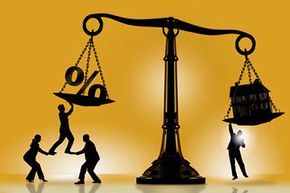What's life without a little risk? That may sound cliché, but in today's credit-dependent culture, it can be difficult or even unwise to go through life without taking some sort of gamble with your finances. To make a living, you'll need a job. To get the job you want, you may need formal education. To get to work, you may need a car. To try to be fiscally prudent in the long term, you may decide it's best to invest in a house. But, because they are so expensive, getting an education, car or house usually requires taking out a loan.
When you get a loan, you aren't the only one taking a risk. The lender is taking a risk on you. Interest rates are the cost of borrowing money and a kind of insurance for the lender. In general, the higher the risk, the higher the cost of borrowing money. But, if you get slapped with a high interest rate, you shouldn't necessarily take it personally. The lending institution isn't just taking a risk on you -- it is also taking a risk on the economy as a whole. You may be a very responsible manager in a juice-bottling factory. But if the economy sinks and the juice market suffers, you might be laid off. The lender has to consider such risk, despite your stellar credit rating. So, in simplistic terms, interest rates are determined based on how much of a risk the lender thinks it's taking on you and the economy.
Advertisement
Mortgage rates, however, are more complex than this. (A mortgage is simply a loan on a house, and a mortgage rate is the interest rate on such a loan.) And you can't point to one institution, such as the bank or the Federal Reserve, that determines your mortgage rate. When you follow the trail, you'll eventually find an intricate and interconnected web of factors that go into what determines mortgage rates.
On the following pages, we'll examine the secondary market of mortgages and then touch on some of the many factors that affect your mortgage rate.
Advertisement
